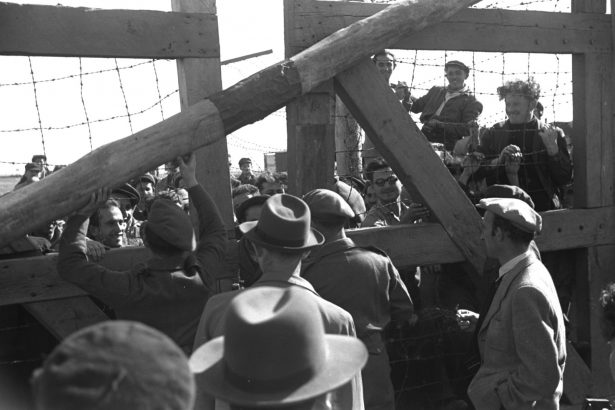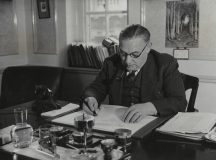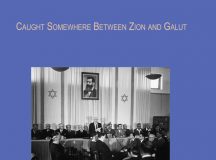Natan Aridan is Lecturer in Israel Studies and researcher at the Ben-Gurion Research Institute for the Study of Israel and Zionism, Ben-Gurion University of the Negev. His most recent book is Advocating for Israel: Diplomats and Lobbyists from Truman to Nixon (Lexington Books, 2017). In this essay he tells the story of the early, difficult years of the relationship between Britain and Israel.
This article focuses on the creation of a modus vivendi in Anglo-Israel relations in 1948-1950, leading to formal diplomatic ties and the exchange of representatives. These relations had been especially tense following Britain’s actions and Jewish reactions during the British Mandate. Although Britain maintained that its policy towards Israel was dispassionate and based upon legal obligations, it continued to supply arms to the Arab nations that invaded the nascent State of Israel within its borders approved by the 1947 UN Partition Plan. At the same time, Britain, with its considerable influence in the region, was Israel’s major trading partner and a vital international player to affecting a resolution of the Israel-Arab conflict.
‘The State of Israel does not exist’
While the US and the USSR granted Israel de facto recognition on 14 and 17 May 1948 respectively, Britain withheld recognition for more than eight months because it did not consider Israel as exercising power or constituting a legitimate government. Res nuillius, ‘belonging to nobody’ was a tenuous argument placing sovereignty in the people of Palestine and reflected British aspirations for an Arab victory. The British Foreign Office maintained that:
If the Arab armies invade the territory of Palestine but without coming into conflict with the Jews, they would not necessarily be doing anything illegal, or contrary to the U.N. Charter. If they cross the frontiers recommended by the U.N. Resolution of November 29th for the Jewish state, they would for the reasons given above, not ipso facto be doing anything illegal though in practice they would no doubt be laying themselves open to public criticism.[1]
In the absence of formal diplomatic relations, Cyril Marriott, British Consul in Haifa represented British interests ‘in the area.’ He had little experience in Palestine issues and acknowledged that he was not the appropriate choice for the task in hand. His ‘experience of Jews was gained in Roumania, where one knew if there was a dirty house in the village it was the Jews.’ His negative image of Jews extended to New York, where ‘one rarely met the Jews in a decent society.’[2] On 1 June, Marriott told Yaacov Salomon, representative of Israel’s Provisional Government in Haifa, that he had ‘warned’ the Mayor of Haifa; ‘Should you bomb the aerodrome at Amman or hit any British craft, we shall blast every Jewish aeroplane in the air and on the land all over Palestine.’[3] When told that the Mayor was not the appropriate authority and that the message should be forwarded to the Provisional Government, Marriott retorted that as far as he was concerned ‘the State of Israel did not exist.’
The Foreign Office’s insistence of addressing letters to Nahum Goldmann, President of the World Jewish Congress as the ‘Agent of the Jewish Authorities’ was indicative of Britain’s refusal to recognise Israel’s legitimacy.[4] Israel did nothing to ease Marriott’s anomalous position in Haifa.[5] He reluctantly concluded that his insistence on being accorded diplomatic status was out of the question because Britain refused diplomatic privileges to his counterpart in London. This situation prevailed until the end of January 1949.[6] Britain claimed its policy of non-recognition was in line with the French. However, the Director General of Ministry for Foreign Affairs (MFA) regularly met with French representatives, and their communications were addressed to the ‘Foreign Secretary of Israel.’
The MFA appointed Joseph Linton, a member of the Jewish Agency and a British citizen, as Consul General in London. Ernest Bevin, Foreign Secretary considered establishing a consulate in Tel-Aviv that would provide for positive unofficial contacts with the ‘Jewish authorities’, but this normal means for establishing contacts, short of recognition, did not come to fruition in deference to offending the Arabs.[7]
The question of recognition was first raised in Cabinet on 27 May, when it was suggested that it ‘might be embarrassing to withhold recognition, if other Commonwealth Governments accorded it.’ Bevin replied that Britain would press governments to withhold recognition. It is noteworthy that his references to ‘the Jewish state’, ‘the Jewish authorities’, ‘the Jewish provisional government’, and ‘Israel’ were used at random.[8]
After its humiliating failures in the region, Britain was determined to use its trump cards, de facto and ultimately de jure recognition of Israel, to extract international recognition of Jordan’s ‘union’ with – and later annexation of – the West Bank. This was dependent on the US agreeing to a quid pro quo involving Israel and Jordan. Bevin maintained that Britain’s refusal to recognise Israel was realistic given that no Arab leader was willing to sit with the ‘Foreign Minister of the State of Israel.’[9] He admitted that ‘a Jewish state of some kind will form part of the eventual Palestine settlement’ but that ‘the state which the Jews now claim to have set up still falls far short of the normal criteria demanded for recognition, and the aggressive declarations of the Jewish leaders are not consistent with their desire to be accepted as a member of the United Nations.’[10] Bevin was determined to offset US criticism, ‘There are certain lines over Palestine from which I cannot deviate. I do not (expect not) intend in the near future to recognise the Jewish State and still less to support any proposal that it should become a member of the United Nations.’[11]
The Foreign Office argued that de facto recognition would be withheld as long as Israel’s borders remained ‘unsettled.’ This moral and legal justification to preserve Britain’s reputation for impartiality was dismissed among others by Winston Churchill, Leader of the Conservative opposition, who attacked government policy: ‘De facto recognition has never depended upon an exact definition of territorial frontiers. There are half-a-dozen countries in Europe, which are recognised today whose territorial frontiers are not finally settled. Surely, Poland is one.’[12] Harold Beeley, Foreign Office desk officer responsible for Palestine, argued that non-recognition was essential given Britain’s overall relationship with the Arab states.[13] His colleague Bernard Burrows, ‘considered our recognition as a valuable card, which must be played to its best advantage.’[14]
On 26 August, an extraordinary Cabinet decision was reached without discussion. Chairing the meeting in the prime minister’s absence, Bevin announced that Jordan would be ‘allowed’ to annex the Arab areas of Palestine and something should ‘be done’ about the ‘unfortunate’ occupation of the Galilee by the Jews.[15] He did not mention that Britain maintained and commanded the Arab Legion fighting in Jerusalem.
The Cabinet decided that although the government ‘might be unable as yet to recognise the Israeli Government, it would be convenient to find some practical arrangement that could be made for establishing direct communication with that government.’[16] Although Bevin sought practical means of establishing direct channels with Israel without formal recognition, British consuls in Jerusalem and Haifa were denied permission to deal directly with the ‘Jewish authorities’ in Tel-Aviv. A thaw came in November with an ‘informal’ British delegation visit. Marriott attended events as a guest of the ‘Provisional State of Israel’, unthinkable a month before.[17]
A major obstacle in Anglo-Israel relations was the future of the 11,000 Jewish detainees incarcerated in Cyprus who desired to immigrate to Israel. Army chiefs and the Foreign Office were adamant that men and women of military age should not be released because they would strengthen Israel by joining the Israel Defense Forces (IDF).[18] Seven months after Israel’s creation and despite Bevin’s declarations to release the detainees under military age, most continued to languish in the internment camps.
Britain continued to regard the whole of Israel as ‘occupied territory’ and thus a justification to withhold recognition.[19] A major irritant to Britain was the UN resolution that incorporated the Negev into the proposed Jewish State. Israel’s control of the Negev irrevocably jeopardised Britain’s uninterrupted hegemony from Basra in Iraq through Jordan to Gaza in Egypt.[20] To halt Israel’s further advance, Britain was alleged to have issued an ultimatum to Israel, which in fact was not Bevin’s machination but initiated by President Harry S. Truman.[21] Intended or not, the ‘ultimatum’ had the desired effect. Israel withdrew from occupied Egyptian territory as a direct consequence of the letter Prime Minister Ben-Gurion received from US Ambassador to Israel James McDonald. Israel prepared to withdraw on 31 December.
Israel treats British presence as hostile
On 7 January 1949, The Times warned of the inherent dangers of non-recognition.
These fears were well founded. The final hostilities in Israel’s War of Independence occurred that Friday afternoon, two hours before the UN ceasefire was to come into effect. Israel’s dilapidated air force shot down five RAF reconnaissance aircraft, sent to ascertain whether the IDF was still on Egyptian territory over the Negev-Sinai border. Two British pilots were killed, one succeeded in making his way back to Egyptian lines, and two were taken prisoners. Israel viewed British military flights between Jordan and Egypt over its airspace as a flagrant violation of international law. The incident was not without precedent. Britain’s disregard for Israel’s sovereignty caused Israel to treat the presence of all British planes as hostile. Three weeks earlier, Israel downed an RAF plane on a reconnaissance flight over the northern Negev.[22]
Abba Eban, Israel’s observer at the UN, admonished Britain’s menacing attitude responsible for the border clashes and for repudiating the 29 May 1948 UN Resolution calling on all governments and authorities concerned ‘to undertake that they will not introduce fighting personnel into Palestine, Egypt, Iraq, Lebanon, Saudi Arabia, Syria, Jordan and the Yemen during the cease-fire.’[23] Since no threat existed on the integrity of Jordan, Britain’s moves could only be interpreted as designed to threaten the southern Negev. He urged UK de facto recognition to reduce tensions.[24]
Hector McNeil, liaison to Israel’s envoys in London, advised Bevin to cut Britain’s losses. Britain had to face the fact that she now played a humiliating secondary role to the US in world affairs. By pretending still to be masters of the Middle East, Britain lost sight of the primary importance of retaining the US goodwill, ‘It is essential even when the Jews are the most wicked and the Americans most exasperating not to lose sight of this point. As long as America is a major power, and as long as she is free, anyone taking on the Jews will indirectly be talking to America.’[25]
On 24 January, news that France granted Israel de facto recognition arrived after the Cabinet meeting where Bevin argued that recognition would only be accorded in coordination with other countries because, by acting alone Britain, would be condoning Israeli belligerence. French recognition thus rendered Bevin’s stance unsustainable.[26]
However, Bevin justified withholding recognition, ‘The Jews had demanded far more than a home in Palestine and that a good deal of the problem had been caused by Jewish intransigence.’ He condemned Israel’s ‘displacement of a half a million Arab refugees,’ but in a sulky acquiescence admitted ‘the State of Israel is now a fact and we have not tried to undo it.’ He expressed disappointment at his failure to present recognition as part of joint Anglo-US policy on the Middle East. He complained:
The fact that the Americans have so consistently favoured one party to the dispute, namely the Jews, has made it necessary for us to bear the whole burden of trying to keep the balance, which is in our joint interest, and to lean or appear to lean further on the other side than would otherwise have been the case.[27]
Reluctant Recognition
On 29 January, Saturday morning (the Sabbath), Linton was summoned to receive an official note of de facto recognition from Bevin at the Foreign Office.[28] Bevin impressed upon him his desire to maintain friendly relations and that despite ‘all the froth in the press and elsewhere, he had never had any prejudice against Israel.’ He told Linton that all Cyprus detainees would be released and free to emigrate and expressed his willingness to use his good offices to assist Jews from Islamic countries wishing to emigrate. Furthermore, Britain wanted to deal directly with Israel’s diplomatic representatives and wished to avoid ‘the intermediary of other Jewish bodies, Members of Parliament, and other individuals.’[29]
Within two days, the Israeli flag flew over its Legation in Manchester Square which was officially inaugurated in the heart of London’s fashionable West End. The celebration was attended by several thousands who watched the affixing of the mezuzah and the traditional blessing. The crowd stood in silence to the memory of those who had fallen so ‘that the State of Israel may live.’ Prayers were recited for the safety and security of State of Israel and ‘for divine wisdom to guide its leaders and Government.’ A torah scroll was carried into the Legation. Linton described the scene:
Standing there as we waited for three o’clock, we saw the Sefer Torah being carried through the crowd, and inconsequentially my mind conjured up the picture of the Olympic bearer entering the arena at the opening of the Olympic games. Here too, was a torch of a different kind, one that had lit the night of the ghettos for centuries.[30]
The appointment of the religious Dr Mordechai Eliash as Israel’s Minister at the Court of St. James’s was regarded as a sensitive gesture. He was an Oxford graduate, served in the Jewish Agency’s Legal Department, and was a Legal Adviser to the National Council. His regular appearances at St. John’s Wood United Synagogue, an influential centre of Anglo-Jewry, where he led prayers, was a salient factor in improving ties with the community. The Foreign Office noted that Eliash was reported to have an aptitude for finance, ‘not peculiar for one of his race.’[31] Eliash presented his credentials to King George VI on 7 April.[32] Israel was incensed at the virtual ostracism of the Legation to social events with the flimsiest of excuses and refusal to grant immunity enjoyed by all legations in London deemed particularly vindictive.[33]
Britain’s delay in appointing the career diplomat, Sir Alexander Knox Helm, Chargé d’Affaires (later Minister) to Tel-Aviv who took up his post in May, came four months after Eliash had in London. Michael Comay, director of the British Desk at the MFA, concluded, ‘I am afraid the British do not emerge in a very dignified light, as they obviously want to enjoy full status without paying the price of proper recognition.’[34]
In addition to its Legation in Tel-Aviv, Britain maintained a consulate in Jerusalem where the Consul-General, Sir Hugh Dow, represented British interests and liaised with the Arabs. Thus, the Foreign Office was able to dispense with the Legation in its negotiations with the Arabs. Dow was informed that ‘The establishment of a diplomatic or quasi-diplomatic mission at Tel-Aviv will not affect your position as described above. You will continue to report independently to the Foreign Office, and you will not be subordinate in any way to Helm.’[35] Britain also maintained a mission in Haifa, where, despite statements to the contrary, from January to June 1949, Marriott represented Britain in Haifa, not in Tel-Aviv.[36]
Israel objected to the anticipated appointment of John Sheringham, (in charge of Palestinian affairs in the Foreign Office’s Eastern Department), to the Tel-Aviv Legation. Although the MFA did not declare him ‘undesirable’, it reminded the Foreign Office that given his part in detaining suspected terrorists during the Mandate period, his appointment involved ‘some risk’ of retaliation. Britain cancelled the appointment out of fears for his safety.[37] Helm protested Israel’s interference in appointments ‘of our Mission in Israel. If we allow the Israelis to get away with this sort of thing. It would merely mean that the Israelis would feel that they could kick us around when they liked and that we ourselves should be thoroughly demeaned in the process.’[38] Israel’s Chargé d’Affaires in London, regretted that, ‘it would have been to our advantage not to have objected to Sheringham’s appointment to the British Legation in Tel-Aviv. He has done, is doing, and will do us far more damage here than he could ever do in Tel-Aviv.’[39]
A quirk of fate, which has escaped attention, was the timing of Helm’s arrival to take up his post in Tel-Aviv on 17 May 1949, the last date which, according to the 1939 White Paper, an independent state (non-Jewish) was to have been established. Helm presented his credentials to President Weizmann on 27 May.[40]
Helm’s initial assessments were as disdainful as Marriott’s. He wrote to Bevin:
One of the greatest handicaps of these people is their inferiority complex. The Jews took a pathetic pride in all their works. Every minor military action is given the appearance of a major victory. They have developed an attitude of arrogance and intolerance towards the feelings of others. Tel-Aviv was unattractive, having the worst features of east and west.[41]
He noted in his annual report of 1949:
This review does not represent Israel in a very attractive light. Nor could it otherwise, for Israel is even now less than 20 months old, it was born of a force applied with unscrupulous singleness of purpose by a people whose inferiority complex and sense of persecution had made them aggressive and blind to the interests of others, and whose easy success, facilitated by world states, merely confirmed the belief that they could do no wrong, and that for them, the age of miracles was by no means over … But though the nature of the Jew cannot be expected to change in a year or two, the stern realities of statehood are progressively making themselves felt.[42]
Helm had difficulties in locating ‘proper housing’ and lambasted his host’s inability to find his staff suitable accommodation. He was infuriated at the presence of faded graffiti near his residence, ‘British invaders out of our country.’ He urged that,
The time has come to tell the Israelis on the highest level that unless they agree forthwith to make available suitable and acceptable residential accommodation … that the whole question of my appointment will be re-examined, and consideration given to the alternative of sending out a much smaller mission on a considerably lower level.[43]
He raised the matter at his first meeting with Ben-Gurion when he complained of having to live in a hotel in Herzliya. Ben-Gurion was unsympathetic. He told him he had the task of finding accommodation for 60,000 homeless people![44]
British attempts to delay Israel’s admission to the UN
Although 20 countries had recognised Israel, on 29 November 1948, Britain succeeded to prevent the seven votes needed for Israel’s admission in the UN General Assembly. The Foreign Office urged that: ‘If the question of membership of the UNO by the Jewish State should arise now or later, HMG should decline to agree and if necessary, exercise their veto, unless the Hashemite Kingdom of Jordan was admitted also.’[45] Alexander Cadogan, Britain’s Ambassador to the UN, refused to allude to Israel or the ‘Provisional Government’ by name, resorting to such circumlocutions as ‘the Jewish authorities in Palestine.’ The USSR’s objection to Transjordan’s application for membership influenced France and the US to withdraw their support. In retaliation, Britain worked to block Israel’s application until Transjordan’s was accepted.[46]
Britain insisted that its policy towards Israel was in accordance with policy to all countries in similar situations. Nevertheless, Cadogan was forced to admit that no objection had been raised to the Republic of Korea’s entry to the UN.[47]
Israel renewed its application on 24 February 1949, the day of the armistice agreement with Egypt. The circumstances had changed; democratic elections were held, and it maintained diplomatic relations with 45 of the 58 UN member states. Thus, Israel believed it fulfilled the requirements contingent on her acceptance for UN membership.
Britain imposed unrealistic conditions for Israel’s acceptance which included a truce with its Arab neighbours, (the armistices of February and March were not considered sufficient) and to observe all UN resolutions.[48] Despite last-minute efforts to prevent Israel’s entry, Britain suffered a diplomatic defeat, on 11 May, when Israel became the 59th member of the UN (37 votes in favour, 12 against, with 9 abstentions). Its efforts to promote Jordan’s entry took a further six years.
Britain’s trump card, the granting of de jure recognition was made contingent on reaching a financial ‘settlement’ with Israel, and on Israel’s conciliatory attitude to the refugee problem, and signed accords with her Arab neighbours. Helm saw a missed opportunity when Israel was admitted to the UN that left Britain almost alone in refusing to grant full recognition after the Benelux countries and Italy had accorded Israel de jure recognition.
Foreign Office official, John Chadwick argued: ‘To accord de jure recognition upon Israel’s admission to the UN would be a graceful compliment to that organisation and rebound to our credit both in Israel and the United States. It offers what is probably the most obvious opportunity for according de jure recognition without serious loss of faith.’[49] His superiors dismissed his suggestion because de jure recognition had not been discussed between the two governments, neither had a unilateral declaration of opinion, and that in the view of the British, the change did not entail such recognition.
With regards to military affairs Israel’s military attaché in London reported that Britain preferred to deal ‘directly with Israel’s military representatives not through its diplomats.’[50] Tensions arose following Britain’s ‘dissatisfaction’ at Israel’s attitude that was ‘souring our mutual relations’ and its military attaché in Tel-Aviv was subjected to ‘rudeness’. While Israel’s military attaché witnessed military exercises, his counterpart in Tel-Aviv, citing ‘security considerations’ was refused access to restricted areas and saw little of any real military interest except witnessing a Civil Guard evacuation exercise at the Tel-Aviv central bus station. Israel’s situation was not analogous with Britain’s because Israel was still at war and military restrictions were in place. Israel feared that British military attachés transferred to Arab countries would supply them with sensitive information.[51]
The Jordanian factor
Although financial considerations (negotiations on the Sterling balances) influenced the decision to grant de jure recognition, the overriding factor was to ensure international recognition of Jordan as a sovereign state and its annexation of the West Bank.
Israel’s diplomats maintained that full recognition would have little practical advantage for Israel.[52] First Secretary, Eliezer Yapou, did not ‘feel that it would be proper for us to press for de jure recognition, or even to ask for it. It will be forthcoming in its own good time without appearing to attach undue value to it.’[53]
Israel’s decision on 23 January 1950, to move government institutions to Jerusalem delayed progress towards de jure recognition. Despite British envoys’ urging against de jure recognition, the Foreign Office responded that Israel was a permanent factor in the Middle East and advised their Arab hosts to do so too. Furthermore, de jure recognition did not imply approval of a country’s policies; recognition of Communist China was one example. Egypt and Jordan had concluded armistice agreements with Israel and therefore, recognition of Israel could not be construed as an unfriendly act.[54]
On 20 April, Bevin declared it was the Government’s intention all along to establish friendly relations between the Arab states and Israel.[55] Having succeeded in accomplishing her aims, Britain encouraged Jordan to proclaim the union of Arab Palestine. Granting simultaneously de jure recognition to Israel and Jordan was considered the realistic solution despite protests from Arab capitals. The US State Department was consulted on a quid pro quo, US recognition of Jordan and annexation of the West Bank, in return for British de jure recognition of Israel.[56] It maintained that the union of Arab Palestine and Jordan was ideal but only in the context of a final peace settlement.[57] Britain officially granted Israel de jure recognition on 27 April.
Israel’s Legation in Britain and the British Zionist Representatives
Immediately following Israel’s creation its leaders had to reassess and negotiate relationships with a formerly preeminent Diaspora that no longer fitted the role of diplomats representing a sovereign state. Israel’s diplomats were entrusted with establishing good relations with all sections of the Anglo-Jewish community, which had the immediate effect of supplanting the status of Zionist representatives who had, for more than 30 years regarded themselves as official intermediaries between the Yishuv and Britain. They deeply resented being shunted aside as Israel’s diplomats and devoted their energies toward improving relations with the non-Zionists. Now that the Zionist Federation’s goal of setting up a Jewish state was realised, it saw its role as providing the link between Britain and Israel, speaking on behalf of Anglo-Jewry on all matters relating to Zionism, Israel, and the Middle East, which caused tension with the Legation.
Eliahu Elath, ambassador to the US, was appointed to replace Eliash upon his sudden death in March 1950. Eliash and Elath had the additional functions as Israel’s ‘Minister Plenipotentiary Envoy Extraordinary to its Jews’. Israel’s representatives were often seen as the representatives of the Jews as illustrated by George VI’s remark to Chief Rabbi Brodie that he had the day before received ‘your ambassador.’[58] Elath continued to cultivating ties with the non-Zionists but was ‘careful not to be running after them, after all, I was Israel’s representative and they would in time after noticing that other dignitaries had met with me, not want to be left out.’[59]
Elath hoped that his American experience would be ‘of some help, in attempting to maintain the required balance in relations with both Zionists and non-Zionists’ and was determined, ‘as the representative of Israel, to unite all our friends around us without distinction as to community or party’.[60] However, ‘one could not escape the feeling of a decline in leadership, of a general pall, a general dullness that now seems to envelop British Zionism.’ He considered appeals to help re-build the ZF but was apprehensive of the potential pitfalls of interfering in the internal affairs of the Jewish community.[61] The Anglo-Jewish commentator Chaim Bermant noted that, ‘since 1948 the Zionist Federation has been like a board of a company, which has been nationalised, which has much goodwill, an immense pool of experience, some capital, and no clear idea what to do with itself.’[62]
Michael Comay, at the MFA, noted that there were many Jews who ‘were deeply moved by Israel and anxious to play their part in building it up, however they wanted to deal directly with Israel and its representatives’ and did ‘not want to accept the Zionist bodies as their middlemen.’ It was ‘a painful process to Zionists who have been doing the job for a generation, and who now see the leadership and the prestige snatched from them by newcomers who stood aloof during difficult times.’[63] One of numerous examples was when Eliash demanded that ZF leader Lavy Bakstansky withdraw a motion at the Annual Conference calling on Britain to grant de jure recognition, because:
The thing was done without previous consultation and evidently without realising that the normal reaction in British circles would be that the demand was instigated by us, we making use of the Conference to press for the fulfilment of a dire need of our own … I feel very strongly against any suggestion that we are begging for de jure recognition.[64]
Conclusion
Britain was responsible for the birth of twins. The first, the Hashemite Kingdom of Jordan, whose invasion, and later annexation of the West Bank it supported to prevent a creation of an independent Palestinian state. The second, albeit by default, was the State of Israel, which initially, was a bane in Britain’s military plans to defend Western interests in the region should World War Three break out. Although Israel remained an ‘irritant’ in the view of the Foreign Office, Britain maintained that her relations with Israel and her Arab neighbours provided her with the unique position of being able to contain Israel’s ‘expansionism’ and remonstrate with the Arabs to moderate their attitudes towards Israel.
References
[1]. UK National Archives, FO 371/68664 6090/6422, FO to UN Delegation, 19 May 1948. See Natan Aridan, Britain, Israel, and Anglo-Jewry, 1949-1957 (Routledge, London, 2004).
[2]. FO 371/68505 6249, Marriott to FO, 26 April 1948.
[3]. ISA, 2412/26, Minute of meeting between Salomon and Marriott, 1 June; Marriott and Harry Beilin, 2 July 1948.
[4]. ISA, 2382/8, Linton’s meetings with Burrows and Beeley, 20 August 1948.
[5]. There were Marriott in the press. Marriott was very unhappy at attacks on him in the press and requested to be relieved from his post, FO 800/477, Marriott to Bevin, 13 June 1948.
[6]. ISA, 2412/29, Marriott received strict instructions ‘not to do anything which might in any way imply recognition of the existence of the State of Israel.’ All communications to the ‘Jewish authorities’ were sent through the Mayor of Haifa.
[7]. ISA, 2412/29, Comay to Eytan, 1 September 1949.
[8]. CAB 128/12 CM (48) 33, 27 May 1948.
[9]. CAB 129/31 CP (48) 207, Bevin, Memorandum, 24 August 1948.
[10]. CAB 129/31 CP (48) 208, Bevin, Memorandum, 25 August 1948.
[11]. FO 371/68649 1078/6760, Bevin to Washington Embassy, 20 May 1948.
[12]. Hansard, House of Commons, vol. 451, col. 2661, 10 June 1948.
[13]. FO 371/68670 6090/11511, 7 September 1948; my interview with Sir Harold Beeley.
[14]. FO 371/68895 11946/12034, Beeley, FO Minute, 9 September 1948.
[15]. CAB 128 CM (48) 57, 26 August 1948.
[16]. CAB 128 CM 78, 6 December 1948.
[17]. FO 371/68699, 13351/14143, O’Leary to FO, 1 November; 14669, Haifa to FO, 3 November 1948.
[18]. Bevin made their release contingent on supporting Jordan’s application to the UN, FO 371/68699 13351/15782, FO to UK Delegation, UNGA, 8 December 1948; ISA, 2412/26, Weizmann to Truman 9 January; FO 371/75367 1052/999, BMEO to FO, 14 January 1949; Foreign Relations of the United States, 1948 Vol. V., 1683.
[19]. FO 141/1322, Cairo to Air Ministry, 19 August 1948.
[20]. Britain did not relinquish hopes to connect its forces in tome of war. See General Sir Brian Robertson Commander in Chief of British Armed Forces in the Middle East fact finding visit to Israel in February 1951, ISA, 37/10 and 36/14, Minutes, Elath’s meeting with Strang, 15 January; 2457/7, 19-22 February; 2586/20, 21 February; 2582/4, 22 February; BGA, BGD, and protocols of meetings, 19-22 February; FO 371/91240 1201/54 and 58, 22 February; 91716 1053/9; 917331 1194/5, 23 February 1951. Four years later, the idea resurfaced in the Anglo-American ‘Alpha’ plan. See 371/111095-115887; FRUS, 1955-57, Vol. XIV.
[21]. FO 371/75045 1016/167, Burrows, FO Minute; CAB 128/15, CAB 3 (49) 17 January 1949; FRUS, 1948 Vol. V, Lovett Minute, 30 December, 171-2.
[22]. ISA, Provisional Council Minutes, Vol. 16, 11 January; 2180/31, Gideon Rafael to Sharett, 10 January 1949. Ben-Gurion Archives, Ben-Gurion Diary, 31 December. Sharett replied to McDonald’s telegram of 31 December 1948. He guaranteed him that all Israeli troops had left Sinai, ‘the Government of Israel must nevertheless register its profound resentment at the attitude of the Government of the United Kingdom as transmitted without comment by the United States Government.’ 2412/26, 3 January 1949. Linton, informed Sharett on 1 January that Lewis Jones of the State Department told him that ‘if we crossed frontier, it would be a serious matter, and quoted from copy of the Anglo-Egyptian treaty’.
[23]. ISA, 2412/26, Rosenne, 11 January; 2412/28, 18 January 1949.
[24]. ISA, 2318/5, Linton to Sharett, 22 January; Linton to Weizmann, 23 January 1949.
[25]. FO 371/75337 1881, Mc Neil, FO Minute, 14 January 1949.
[26]. CAB 128/15 CM (49) 6, 24 January 1949. British fears of repercussions in the Arab world were to some extent allayed since Egypt and Lebanon had met face to face with Israelis at the armistice negotiations, itself a form of recognition. The Chinese government intended to recognise Israel on 25 December. The Foreign Office pondered it would be ‘rather ironic that Britain recognise Israel on Christmas Day’, FO 371/75208 1056/15164, 7 December 1948.
[27]. FO 371/75337 1016/1932, Bevin to Franks, 3 February 1949.
[28]. ISA, Provisional Council Minutes, Vol. 16, 30 January 1949.
[29]. ISA, 2583/4, 29 January 1949.
[30]. ISA, 36/2, Linton, to MFA, 31 January 1949.
[31]. Fletcher-Cooke, FO minute, 18 February 1949.
[32]. ISA, 2583/4, Eliash to MFA, 27 April 1949.
[33]. ISA, 2583/4, Talk, Burrows, Helm and Linton, 9 March 1949.
[34]. ISA, 2589/12, Comay to Eliash, 12 May; 2412/26, MFA, ‘British Policy Towards Israel – November 1947-May 1949’, 12 May 1949.
[35]. FO 371/75269 1891/6043, Burrows to Dow, 10 May 1949.
[36]. ISA 2594/7, Marriott to Beilin, 14 March; 36/12, Comay’s meeting with Marriott, 23 February 1949.
[37]. ISA, 2583/4, Linton to MFA, 24 March 1949.
[38]. FO 371/75202 1051/437, Helm to FO, 25 March 1949.
[39]. ISA, 2583/5, Kidron to Comay, 13 January 1950.
[40]. ISA, 36/12, MFA Minute, 27 May; FO 371/75269 1891/6345, Helm to FO, 19 May 1949.
[41]. FO 371/75207 1052/65611, 75194, 1016/7194, Helm to Bevin, 23, 31 May 1949.
[42]. FO 371/82506 1015/9, Helm to McNeil, 29 January 1950.
[43]. FO 371/75202 1051/437, Helm to FO, 25 March 1949.
[44]. BGA, Ben-Gurion Diary, 30 May; FO 371/75269 1051/7143, Helm to FO, 30 May; ISA, 36/12, Minute, Helm and Ben-Gurion, 30 May 1949.
[45]. FO 371/68665 6090/6548, Wright conversation with Bevin, 15 May 1948.
[46]. FO 371/75209 1071/2313 and 1673; Cadogan to FO, 3 and 10 February 1949.
[47]. FO 371/75209 1071/2571, Tel. no. 433, Cadogan to FO, 25 February; 1071/2620, Telegram no. 451, Cadogan to FO, 26 February 1949.
[48]. FO 371/75209 1071/2313, Mc Neil, FO Minute, 10 February; 1071/2910, Burrows, FO Minute, 1 March; 75208 1071/2789, Tel. 478, March 2; 75209 1071/2790, Tel. 479, 2 March; 75210 1071/3116, Tel. 77, 4 March; 75210 1071/3519, 13 March 1949.
[49]. FO 371/75308 1421/6283, Chadwick, FO minute, 10 May 1949.
[50]. ISA, 38/12, Israel military Attaché, Salmon’s reports on arms purchases, 5 July-18 August; 2445/1, Intelligence Survey, IDF, November 1950.
[51]. ISA, 38/12, Comay to Kidron 23 August; Meeting of military attachés, October 19; correspondence, Rosenblum of the IAF and O’Neil, British Military Attaché, November; 2594/8, 2594/9, 40/11c, Shortt-Salmon correspondence; ‘Relations with the Military Attachés,’ 11 and 12 December 1950.
[52]. ISA, 2586/14, Kidron to Comay, 21 March 1950.
[53]. Ibid., 4 January 1950.
[54]. FO 371/82577 1053/4, Cairo to FO, 2 February 1950.
[55]. This was preceded by a memorandum a month earlier when reference to Israel did not appear, CAB 129/39 CP (50) 55, 30 March; 78, 20 April 1950.
[56]. Britain and Pakistan were the only countries to recognise de jure the annexation of the West Bank to the Hashemite Kingdom of Jordan.
[57]. FRUS, 1950, Vol. V., 870.
[58]. My interview with Eliahu Elath.
[59]. Ibid.
[60]. ISA, 2387/21, Elath to MFA, 19 November 1950.
[61]. ISA, 2585/12, 28 March; Jewish Chronicle, 30 March 1951, 8.
[62]. Chaim Bermant, Troubled Eden: An Anatomy of British Jewry (London, 1969), 113.
[63]. ISA, 2590/6, Comay to Elath, 29 July 1951.
[64]. ISA, 2586/4, 9 March 1950.





































